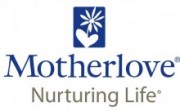By Bettina. Posted on August 10, 2010
Did you think we were only going to celebrate World Breastfeeding Week? Of course not! In many countries around the globe, breasfeeding is celebrated during the whole month of August, and sometimes September too, and other odd weeks here and there. We say, let’s celebrate them all! Our Mom-Made Wonderfood is truly worthy of celebration, every day. Whether it comes straight from the tap, the bottle, or via a human milk bank, its a superpower that fights diseases in mom and baby, and helps to clean up the planet - all in a single bound. Even Clark Kent would be jealous.
We’ve seen a lot of breastfeeding companies doing giveaways and promotions this last week—and in tough economic times, a freebie or a discount is a good thing! But how many of those companies are truly investing in changing our breastfeeding culture and beating the booby traps? When only 3% of hospitals are designated baby-friendly; when too few doctors are educated on the basics of lactation management; when women can are still being harrassed, and even abused, for breastfeeding in public; and when ours is one of the only industrialized countries without paid maternity leave—and the list goes on—moms need more than a coupon or some helpful information on a website. Building the “mother of all causes” takes some serious cash.
That is why we are extremely pleased to present the “Ultimate Giveaway that Gives Back” that not only celebrates breastfeeding but also showcases some wonderful companies that are going above and beyond to help moms and babies. Everyone of the sponsors represented in the baskets below is committed to working with Best for Babes to change the breastfeeding landscape for our sisters, our friends, and our daughters, and really for all of us, because when moms are no longer prevented from achieving their personal breastfeeding goals, everyone benefits. These companies also happen to make some of the best products on the market, because while all you really need to breastfeed is at least one boob and a baby, there are a lot of things that can make breastfeeding more comfortable, appealing and convenient. After all, if some cute workout gear can motivate you to go to the gym, then certainly a sexy nursing top can boost your confidence, make you feel fabulous, and empower you reach your breastfeeding goal! We say, whatever works for you, babe!
How to Win: Here’s the special twist on our giveaway. In the spirit of giving back, we are asking you to nominate someone else for the gift basket, someone whom you really think could benefit from this extravaganza: for example, a mom who really wants to breastfeeding but can’t afford a top-quality breastpump to go back to work, or for whom babywearing (and the multi-tasking that goes with it) would make a world of difference. First, leave a comment describing the person you would like to see win basket (1-Expecting Mom) or basket (2-Working Mom) below, and then, make sure you “Like” our facebook page. At the end of the month, everybody will vote on the nominations, and we will check and make sure that the winner is legit before shipping the gift baskets in beginning of September. The generous-minded person who nominates the winner will get a lovely gift too-A Belabumbum Lily Sleepwear set (see the Expecting Babe Basket) and a Best for Babes T-shirt!! Total value of the giveaway is a mind-blowing $1,500 smackeroos.
#1. Ultimate Best for Babes Giveaway Basket for the Expecting Babe
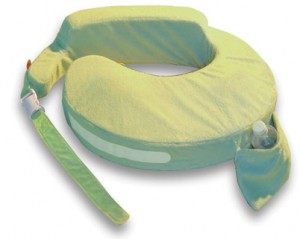
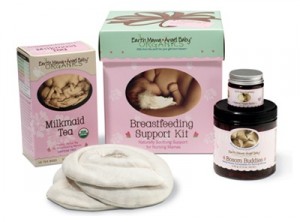 My Brest Friend Deluxe Breastfeeding Pillow has a wrap-around design with a silent, quick-release strap, back support and a firm, flat cushion that keeps baby from rolling and promotes the optimum latch; with soft, washable cover.
My Brest Friend Deluxe Breastfeeding Pillow has a wrap-around design with a silent, quick-release strap, back support and a firm, flat cushion that keeps baby from rolling and promotes the optimum latch; with soft, washable cover.- Earth Mama Angel Baby Breastfeeding Support Kit includes Milkmaid Tea to support healthy breast milk production, lanolin-free nipple cream to prevent or heal sore, cracked nipples, gel- and toxin-free breast packs ease breasts sore from engorgement or mastitis, and organic, herbal breast compresses provide extra nipple and engorgement care.
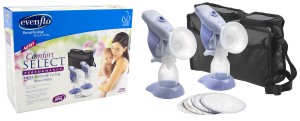 Evenflo Comfort Select Performance™ Dual Breastpump with autocycling vacuum is newly improved and perfect for occasional pumping; it runs on batteries or can be plugged in for traveling convenience. Two pumps can used simultaneously for greater efficiency, or leave a spare where you are likely to need it, comes in carry case.
Evenflo Comfort Select Performance™ Dual Breastpump with autocycling vacuum is newly improved and perfect for occasional pumping; it runs on batteries or can be plugged in for traveling convenience. Two pumps can used simultaneously for greater efficiency, or leave a spare where you are likely to need it, comes in carry case. Posh Pads are ultra fashionable, reusable, earth-friendly organic cotton and bamboo nursing pads that are so gorgeous, you can use them as coasters when you are done nursing. In outrageous colors and patterns to suit every bra and boob.
Posh Pads are ultra fashionable, reusable, earth-friendly organic cotton and bamboo nursing pads that are so gorgeous, you can use them as coasters when you are done nursing. In outrageous colors and patterns to suit every bra and boob.- Moby Wrap Custom Best for Babes Carrier is made of the softest of cotton fabrics, is extremely comfortable, and is one of the safest baby carriers available today. It distributes weight evenly from parent’s shoulders to hips and aligns baby’s center of gravity as close to the parent’s body as possible. Svelte black with the signature Best for Babes logo on it!
- Mother’s Boutique Sweet Embrace Necklace is a gorgeous sterling silver pendant on a leather cord, designed by Judy Masucci, owner of the Mother’s Boutique. It symbolizes the love between a mother and child and represents a breastfeeding mother or any mother holding and loving her child.
 Belabumbum Lily Sleepwear Set comes with a robe, cami and pants perfect for snoozing and lounging and feeling fabulous! Belabumbum believes that women grow more beautiful while expecting and while nursing, so their lingerie confections encourage women to feel pampered, sexy, and hip — during and after pregnancy.
Belabumbum Lily Sleepwear Set comes with a robe, cami and pants perfect for snoozing and lounging and feeling fabulous! Belabumbum believes that women grow more beautiful while expecting and while nursing, so their lingerie confections encourage women to feel pampered, sexy, and hip — during and after pregnancy. Hadley Stilwell Sleeveless Crossover Shirt is ultra-luxe and stylish, perfect for date night or a meeting with the executive committee. HadleyStilwell designs are meant to be clothes you want to wear - that just happen to accommodate nursing and pumping - and many moms keep them as long-term staples of their wardrobe. Gift certificate so you can choose the color and size.
Hadley Stilwell Sleeveless Crossover Shirt is ultra-luxe and stylish, perfect for date night or a meeting with the executive committee. HadleyStilwell designs are meant to be clothes you want to wear - that just happen to accommodate nursing and pumping - and many moms keep them as long-term staples of their wardrobe. Gift certificate so you can choose the color and size.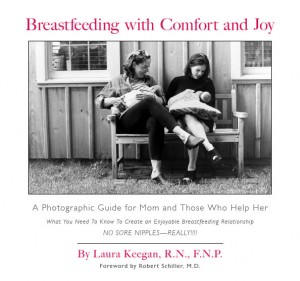 Breastfeeding with Comfort and Joy Book is a stunning coffee table quality book with evocative photos of breastfeeding and parenting combined with clear, expert guidance on how to start and continue a breastfeeding relationship with ease and prevent and solve any problems.
Breastfeeding with Comfort and Joy Book is a stunning coffee table quality book with evocative photos of breastfeeding and parenting combined with clear, expert guidance on how to start and continue a breastfeeding relationship with ease and prevent and solve any problems.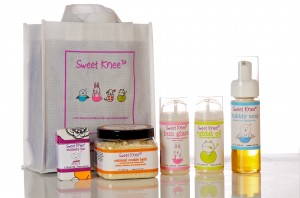 Sweet Knee Gift Bag includes an adorable, reusable cloth bag filled with splendidly all-natural bubbly soap, oatmeal cookie bath, bun glaze for tender tushies, 3.2 oz rubbit oil for massaging or moisturizing, and a 3.75 oz hulababy bar soap.
Sweet Knee Gift Bag includes an adorable, reusable cloth bag filled with splendidly all-natural bubbly soap, oatmeal cookie bath, bun glaze for tender tushies, 3.2 oz rubbit oil for massaging or moisturizing, and a 3.75 oz hulababy bar soap. Be Nice Prenatal Vitamin Drink Mix allows you to get your essential prenatal vitamins and minerals, in easy to take and carry portions for better nutrient absorption and hydration throughout the day. Doctor approved, it comes in two delicious, naturally sweetened flavors.
Be Nice Prenatal Vitamin Drink Mix allows you to get your essential prenatal vitamins and minerals, in easy to take and carry portions for better nutrient absorption and hydration throughout the day. Doctor approved, it comes in two delicious, naturally sweetened flavors.
#2. Ultimate Best for Babes Giveaway Basket for the Working Babe
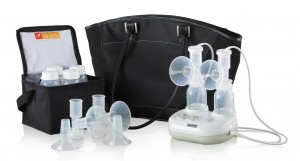 Ameda Purely Yours Ultra Breastpump is a top-of-the-line electric breastpump that is preferred by lactation consultants and doctors and can be converted for one-handed manual use. Cycles per minute and suction can be adjusted to maximize milk output. The patented diaphragm ensures no milk or bacteria can enter the tubing or motor, and no contaminants from the pump can enter your collected milk. Comes with a stylish, sophisticated pebble-grained tailored tote, cooler (holds 6 bottles-included), a car lighter adapter, 3 different sizes breast flanges (with more available), and various pump accessories.
Ameda Purely Yours Ultra Breastpump is a top-of-the-line electric breastpump that is preferred by lactation consultants and doctors and can be converted for one-handed manual use. Cycles per minute and suction can be adjusted to maximize milk output. The patented diaphragm ensures no milk or bacteria can enter the tubing or motor, and no contaminants from the pump can enter your collected milk. Comes with a stylish, sophisticated pebble-grained tailored tote, cooler (holds 6 bottles-included), a car lighter adapter, 3 different sizes breast flanges (with more available), and various pump accessories.- Pumpease Bra Supports make pumping at work or home much easier because it allows you to pump hands-free. The 6″ wide pumping supports feature patent pending, ‘no-stitch’ horn openings, guaranteed to accommodate any breast pump on the market, in a variety of gorgeous prints that allow you to “express” your personal style and fashion sense.
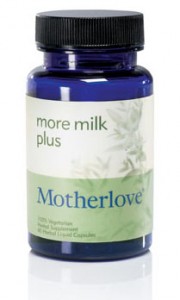 Motherlove More Milk Plus capsules contain a special blend of safe and effective herbs designed to quickly increase breast milk for breastfeeding mothers, created by one of the leading companies in the holistic body care industry.
Motherlove More Milk Plus capsules contain a special blend of safe and effective herbs designed to quickly increase breast milk for breastfeeding mothers, created by one of the leading companies in the holistic body care industry.  Pure, natural and organic-use under the care of a lactation specialist. Not for use during pregnancy.
Pure, natural and organic-use under the care of a lactation specialist. Not for use during pregnancy.- Breastpumps and Briefcases Audio CD contains valuable information to ease your transition back to work, including how to maintain your milk supply, how to create a pumping schedule, make arrangements with your employer, and store your milk. Shari Criso’s reassuring manner and tips for succeeding with breastfeeding have helped thousands of moms achieve their personal breastfeeding goals.
- Hotslings pouches allow you carry your baby in fabulous style, safety and comfort. So pretty they can be worn to coordinate with your designer suit for the boardroom if your employer allows babies at work! Can be exchanged for a size and print you prefer.
 Created by one of the leaders in the industry who also actively writes American safety standards for sling-style baby carriers.
Created by one of the leaders in the industry who also actively writes American safety standards for sling-style baby carriers.
- Mother’s Boutique Sweet Embrace Necklace is a gorgeous sterling silver pendant on a leather cord, designed by Judy Masucci, owner of the Mother’s Boutique. It symbolizes the love between a mother and child and represents a breastfeeding mother or any mother holding and loving her child.
- Hadley Stilwell Sleeveless Crossover Shirt is ultra-luxe and stylish, perfect for date night or a meeting with the executive committee. HadleyStilwell designs are meant to be clothes you want to wear - that just happen to accommodate nursing and pumping - and many moms keep them as long-term staples of their wardrobe. Gift certificate so you can choose the color and size.
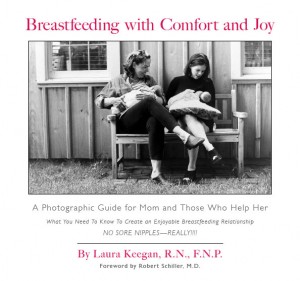
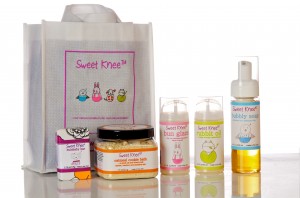 Breastfeeding with Comfort and Joy Book is a stunning coffee table quality book with evocative photos of breastfeeding and parenting combined with clear, expert guidance on how to start and continue a breastfeeding relationship with ease and prevent and solve any problems.
Breastfeeding with Comfort and Joy Book is a stunning coffee table quality book with evocative photos of breastfeeding and parenting combined with clear, expert guidance on how to start and continue a breastfeeding relationship with ease and prevent and solve any problems.- Sweet Knee Gift Bag includes an adorable, reusable cloth bag filled with deliciously all-natural bubbly soap, oatmeal cookie bath, bun glaze for tender tushies, 3.2 oz rubbit oil for massaging or moisturizing, and a 3.75 oz hulababy bar soap.
Our deepest gratitude to all these great companies that support moms and babies and Best for Babes with their generous donations! Leave a comment below nominating a person you would like to see win a gift basket, and make sure to say which one: “#1-Expecting” or “#2-Working” and why, and jump over and “Like” our facebook page too! Thank you for giving back, and for helping us make sure that the gift goes to someone who could genuinely use it and for whom it would make a difference in achieving their personal breastfeeding goals.
By Bettina. Posted on February 22, 2010
A couple of months ago I had a conversation with a mom on Twitter who had struggled with breastfeeding, and had been unable to find a support group either within or outside of her place of employment that accomodated working mothers. She was extremely frustrated and disappointed. Since not finding a breastfeeding support group can be a big “Booby Trap” that moms need help navigating and overcoming, I thought her story would be a great springboard to open the discussion and find out what mothers in a similar boat have done that works! Please read excerpts from her story below, and share your strategies and resources in the comments. We will use this discussion to generate a “Best for Babes Guide” to finding or creating a breastfeeding support group for working moms, either within or outside the workplace, and list your tips & suggestions! To get the Solutions section started, underneath Anna’s story I am sharing the success of @crafteegirl in starting a workplace support group. Please note that we are NOT talking about employer lactation programs, that is a whole other kettle of fish; for more information on starting an employer lactation program see http://www.workandpump.com, or our Champion for Moms Juanita Ingraham’s story, complete with resources and advice. 
Anna’s story*
The hospital breastfeeding class I took gave me a handout that included coupons for new-parent groups by age (which you could pay to continue) which, given they’d be made up of people in the classes, might be BF’ing friendly. Unfortunately, all were Tuesday-Thursday in the middle of the day (between 9 am and 3 pm). So much for the working mother once back to work! I didn’t bother going - the first months are hectic and the hassle didn’t seem worth it, all for something I’d have to give up. No evening options. No weekend options. Clearly, working mothers don’t need support.
So I checked out La Leche League. None within an hour’s drive of my house meets at a time that a person working standard office hours could make, unless perhaps they happened to be just down the street and did it on their break. Unless their day care was local, they’d be doing it without the baby, too. Over half were on hiatus. Some people have suggested that I should have just emailed the leaders. But I am very shy about approaching strangers, and didn’t want to come across as asking volunteers to turn their schedules around to accomodate me. Nothing on the website pages indicated any sort of openess to any change in schedule. It would have been at least nice if the website simply ACKNOWLEDGED the shortcomings of these schedules, for example, “We apologize for not having an evening/weekend group, but the organizers of this group have schedules that don’t allow for it.” or “We don’t currently have a weekend group but would be open to restarting a Saturday morning group if there is enough interest again; please email us.” . . . Seriously, just acknowledge the working moms exist. Not having a support group would still stink, but at least we wouldn’t be invisible.
There’s also a local mother’s group, part of Mom’s Club, in my city. Let me just quote: “We are specifically aimed at supporting moms who choose to stay at home with their children, including those who work out of their homes, as well as those who work part-time. We are the first, largest and fastest growing support group specifically for at-home mothers.” / “In order to become a member, you must be a mom and live in Wilsonville. Although any mom can join, most of our activities are during the day.” At least they were up front about it. And of course, they’re not a breastfeeding support group.
Message heard loud and clear, here: mothers who work outside the home are not in need of, or are not deserving of, support. In parenting, in breastfeeding, in anything. Never mind that just like being a stay-at-home mother, being a working mother has its ups and downs; never mind that breastfeeding really does need support. Yes, I wouldn’t expect a mother who works in the home and never pumps to have my concerns with storage of bottled breast milk, but the latch issues and the social support for extended nursing and so on would be welcome. If, you know, there were social support, which for people like me in this area there actually isn’t.
The good thing has been the internet. The breastfeeding community on LiveJournal, the Twitter community…you folks have been hugely supportive and informative. I think I’d have kept BFing anyway, I hope I would, because I operate on sheer stubborn and I WAS going to give my son the best I could. But you are the people who made it seem doable, who gave me the information I needed to tell off the medical professionals when they were being stupid (once I started reading and asking, anyway!), who have made me feel that I am not alone.
Locally? Except for one coworker, with whom I don’t really discuss issues, I am alone. On the internet, I’m not. But surely it can’t be right that the internet is the only place to find support. Where’s the community of likeminded people locally, with whom I could hang out, share a pastry, visit if we become friends? Not that I don’t love the people I meet on the ‘net but there’s a distance (literally and figuratively), and it seems unfair that there ARE local resources…if I didn’t work. It would seem less unfair if any of them even acknowledged that they are, by their schedules, excluding an entire class of mothers. But it seems like we don’t exist, to them.  Very alienating and frustrating, at least for me.
Very alienating and frustrating, at least for me.
(And my son? No supplemental formula since 6 weeks, almost none after 4 weeks, still breastfeeding strong. AND we got rid of all of the FREAKING hardware. My pediatrician was surprised-and-pleased that he was still BF at 6 months and going strong - she was very encouraging but with the start the hospital got us off to, she didn’t expect me to pull it off. Stubbornness, and information, are good things….)
(*name changed to protect anonymity at writer’s request)
Solutions
From @crafteegirl: I work for the State of Michigan and a co-worker and I started a support group for pumping moms. We called it Express Yourself because it fit the idea that we were “expressing milk” and that we wanted moms to feel free to talk about what worked for them and their goals without fear of judgement. We meet once a month on our lunch hour and talk about whatever the group wants to discuss. Not all of us are pumping anymore and not all of us are nursing at all anymore. We even have some moms come when they’re pregnant! We love that. We also keep a list of everyone’s e-mail address and send out information that moms might find exciting (i.e., resources in the community, new studies about breastmilk and breastfeeding, etc.). Though a friend and I started the group, we want every mom to feel like she can offer her experiences or opinions to the group. We don’t always talk about just breastfeeding…as moms there’s so much that goes on in our lives and we want to be able to share and discuss all aspects of motherhood. We started in March of 2009 and we already have had 2 babies born to our moms, who are both nursing successfully! It’s been a great group of women and we’re proud to have been a part of it!
Now, it’s your turn, working moms: please share your story, what resources you used and what worked for you!
By Bettina. Posted on September 28, 2009
This post is part of the September Carnival of Breastfeeding, and it’s our first time participating, so we would love to hear what you think! Please scroll down and read the other interesting posts, too.
This month’s theme is working and breastfeeding, since September starts with Labor Day. We’ve put together a summary of Best for Babes’ thoughts on working and breastfeeding:
1) The case of Allen vs. Totes/Isotoner put a spotlight on just how difficult it is to go back to work and pump milk, especially for blue-collar workers. Allen was fired for taking unauthorized pumping breaks (though unauthorized bathroom and smoking breaks seem to be okay), and the Ohio Supreme Court ruled in favor of the employer on the grounds that it was not pregnancy discrimination. Salon.com and others pointed out the absurdity of separating lactation from pregnancy. It would behoove all of us to remember that babies are born extremely developmentally immature, and that breastmilk completes the lining of the digestive tract in a way that no substitute can, so it is important to think of lactation as a later stage of the pregnancy/birth continuum. I think it would also be useful to point out that asking for pumping breaks is no easy thing in a culture that is squeamish about breastfeeding. When I was at Merrill Lynch, I don’t know if I would have been comfortable talking to my superior about needing to pump, I would have been far too embarrassed! We need more mothers like LaNisa Allen to challenge the system; heck, this is one area where lawsuits would come in handy.

Mrs. US Beauties 2009 Juanita Ingram
2) Juanita Ingram, winner of the Mrs. U.S. Beauties 2009 success pageant, shares her story of fighting against humiliation and discrimination for pumping in the workplace. A corporate attorney, Ms. Ingram put together an airtight case demonstrating cost-savings for her employer and succeeded in persuading them to establish a corporate lactation program. She is a powerful role model and champion for moms, and we need to hear more stories of mothers that fought smart and paved the way for other working moms.
3) Some companies have established excellent corporate lactation programs; sadly, some companies are forming shady alliances with companies who have a vested interest in seeing mothers fail at breastfeeding. Be careful who you trust: Moms need to once again have their wits about them and make sure that their employer is not giving them clever marketing materials which look great on the surface but are carefully constructed with misleading information likely to undermine their breastfeeding success. Hint: if there are any formula company logos (or those of their pharmaceutical company parents) on those materials, you are being “booby-trapped!” The best dressed wolf should not be minding the sheep!
4) Every October, Working Mother magazine puts out an issue of 100 Best Companies for Working Mothers.  Much to our dismay, manufacturers of infant formula such as Bristol Myers Squibb and Abbott Laboratories have routinely made the top of this list despite aggressive marketing tactics that conspire to prevent all mothers from making truly informed feeding decisions, and actively prevent vulnerable new mothers who want to breastfeed from succeeding. To improve their corporate image and win loyalty from working moms, these companies work very hard (and pay a lot of money) to get top billing on the Working Mother list, and be seen as a good corporate citizen. Sorry, but we think that any company that at its very core undermines moms is not a great company for working mothers, period. Formula-feeding moms (many of whom wanted to breastfeed but were boxed into a corner by the formula-industry created “booby traps“) will make 3 times as many visits to the hospital with baby than breastfeeding moms do, and mom and baby’s pain and suffering (think ear infections, reflux, intestinal infections, allergies, asthmas, some childhood cancers, obesity, diabetes) will be unnecessarily greater, not to mention the huge cost increase. Formula-feeding is associated with increased health risks for moms too: heart disease, breast cancer, ovarian cancer, rheumatoid arthritis, diabetes and obesity. Sort of cancels out the nice policies and cushy benefits that won these companies a top spot, no? I’ll take a company that respects me and my boobs, thank you!
Much to our dismay, manufacturers of infant formula such as Bristol Myers Squibb and Abbott Laboratories have routinely made the top of this list despite aggressive marketing tactics that conspire to prevent all mothers from making truly informed feeding decisions, and actively prevent vulnerable new mothers who want to breastfeed from succeeding. To improve their corporate image and win loyalty from working moms, these companies work very hard (and pay a lot of money) to get top billing on the Working Mother list, and be seen as a good corporate citizen. Sorry, but we think that any company that at its very core undermines moms is not a great company for working mothers, period. Formula-feeding moms (many of whom wanted to breastfeed but were boxed into a corner by the formula-industry created “booby traps“) will make 3 times as many visits to the hospital with baby than breastfeeding moms do, and mom and baby’s pain and suffering (think ear infections, reflux, intestinal infections, allergies, asthmas, some childhood cancers, obesity, diabetes) will be unnecessarily greater, not to mention the huge cost increase. Formula-feeding is associated with increased health risks for moms too: heart disease, breast cancer, ovarian cancer, rheumatoid arthritis, diabetes and obesity. Sort of cancels out the nice policies and cushy benefits that won these companies a top spot, no? I’ll take a company that respects me and my boobs, thank you!
5) We’ve come across some great resources recently regarding working and breastfeeding, and I am going to list a few here just in case you haven’t seen them yet:
- http://www.workandpump.com excellent! pumping tips, download employer packet, more
- http://www.workplacenursing.com a consulting service for employers
- http://www.womenshealth.gov/breastfeeding/programs/business-case/ The government’s resource guide for company lactation programs
- http://www.breastfeeding.com/workingmom/lactation_program.html
6) Many magazines and websites provide lists of “must-have” items for working moms. When you do your shopping, consider patronizing companies that are supporting Best for Babes to bring about a culture shift and remove the “booby traps” to breastfeeding successfully. We are only working with the crème de la crème, pun intended: Nipple cream and soothing packs: http://www.earthmamaangelbaby.com. Nursing tanks: http://www.glamourmom.com Hands-free pumping support (type and pump at the same time!) http://www.pumpease.com And for an awesome lean, green pumping machine, try the Hygeia pump: http://www.hygeiababy.com .
Please check out these other “Carnival of Breastfeeding” posts on working and breastfeeding (will be updated continuously:
Blacktating: The 5 biggest mistakes working & pumping moms make
Stork Stories: My breastpump and I didn’t get along (links to another great post, too: Ask An LC about pumping)
Breastfeeding Moms Unite: Breastfeeding at My Family Daycare
Marshins: Taking Your Working Boobs To Work
The Milk Mama: A Job Where Everyone Breastfeeds
Strocel.com: Working and Breastfeeding a Toddler
The Marketing Mama: Working and Pumping
Momnesia the Book: Sorry, Facilities Guy
Motherwear Breastfeeding Blog: Breastfeeding and working is possible, and you can make it work
Chronicles of a Nursing Mom: Do you really need a pump?
Vanderbilt Wife: I Think This Officially Makes Me a Mommy Blogger
babyReady: What About Breastfeeding When I Go Back to Work
Breastfeeding 1-2-3: Tips for Breastfeeding and Working
Breastfeeding Mums: Breastfeeding and Working in the UK
MumUnplugged: This is a Breastfeeding Office
My World Edenwild: Nursing Mothers Need Workplace Support
By Bettina. Posted on September 16, 2009
Juanita Ingram, Mrs. U.S. Beauties 2009 (a national success pageant) saw our feature in Fit Pregancy and asked how she could support our cause! We asked Juanita to share her story in part because of the recent Totes/Isotoner v. Allen case (the Ohio “Fired for pumping” case) but mostly because we think she is a fabulous role model. We admire her tenacity and positive attitude in approaching her employer and “beating the booby traps”-the barriers that keep moms from achieving their personal breastfeeding goals. We are pleased to name Juanita Ingraham as a Best for Babes Champion for Moms. Here is Juanita’s story:

Mrs. US Beauties 2009
I am a wife, mother, lawyer, national queen for Mrs. U.S. Beauties 2009 and strong proponent for breastfeeding and the rights associated therewith.
I set and accomplished a great number of goals in my life to date; I finished college and went on to obtain my JD/MBA, passed the bar in two states and practiced with large firms and corporations. I served as a business law adjunct professor, inspiring young minds to pursue legal careers, received the Up and Coming Lawyer – Leadership In Law Award and recognized as on of the Top 40 Under 40. In addition, I became the first African-American woman to compete and win the title of Mrs. Indiana United States in 2007 and just this year I competed and became the national queen for Mrs. U.S. Beauties 2009, a pageant system that celebrates the success of the modern woman and inspires all women to achieve their goals and dreams. While all of the aforementioned experiences were joyous, none of them compare to the happiness that motherhood has brought to my life. When my daughter looks at me and smiles, I can see the unconditional love in her eyes for me. Her sincerity makes me feel like a queen everyday and I feel grateful knowing that I gave my daughter the best start in life that I possibly could - I successfully and exclusively breastfed my daughter for the first 15 months of her life. This accomplishment, like any other, was not without obstacles and challenges.
When my daughter was born in January of 2008, I was legal counsel for a large retail real estate investment trust. Practicing law full-time as a new mom, while my husband traveled often for extended periods of time with his job, was an extremely challenging undertaking. I was determined, however, to set and achieve the goal of breastfeeding my daughter for at least 12 months. But setting the goal wasn’t all that would be required to achieve the goal.
Prior to leaving for maternity leave, I asked our HR department about the details of the company’s corporate lactation program. I just assumed that a company of its size in the 21st century would surely have such accommodations in place. I was shocked to learn that it did not. Not only was there no formal corporate lactation program, but it was against company policy at the time to use any office for pumping purposes. In addition, many women in the company expressed to me that they had given up the idea of breastfeeding because of limited support and nonexistent accommodations. Moreover, those who did continue were forced to do so in an almost public fashion by sharing the “sick room” and pumping in front of each other, exposing themselves to one another whether they preferred to or not. If the sick room was occupied with a sick employee, there were no accommodations available for employees to pump. There were also numerous situations where lactating mothers within a particular department obtained permission from a supervisor to use a conference room to pump but those pumping sessions were often interrupted by HR personnel who would open the door, remove the curtain—without giving the lactating mothers time to cover themselves—and verbally admonish them, declaring their actions to be against company policy. These women were humiliated and discouraged. On several occasions I was even asked by fellow co-workers why I “just couldn’t use a bathroom stall” and I politely explained to them that I didn’t feel it was appropriate for me to pump in a toilet stall for the same reasons they would not prepare their food while standing next to a toilet in a bathroom stall. After hearing of the numerous horrific incidents involving other lactating moms at the company and experiencing first hand the unsupportive atmosphere, I was determined to take action and initiate a formal corporate lactation program for myself and others!

Juanita Receiving the Up & Coming Lawyer Leadership in Law Award
I started by researching the law with regard to a woman’s right to breastfeed at work and was pleased to find that the state of Indiana had recently passed a law requiring all companies with a certain number of employees to provide reasonable time, pumping and storage accommodations for lactating employees. I then researched and created a proposal for a formal corporate lactation program setting forth all of the proven benefits that support the existence of such programs. For example, studies have shown that if working mothers breastfed their infants for at least 100 work days, 41% of infants never get sick in their first year of life compared to 10% of formula-fed infants whose mothers experience more than twice as much absenteeism as do the breastfeeding mothers in the first year of the infant’s life. Similarly, a study of Working Well Moms, CIGNA’s corporate lactation program for employees who breastfeed, revealed a savings of $240 thousand annually in health care expenses for breastfeeding mothers and their children. In addition, a savings of $60 thousand annually is realized through reduced absenteeism among breast- feeding mothers at CIGNA. The study also found that pharmacy costs for breastfed children are lower, because they require 62% fewer prescriptions.
After equipping myself with the applicable law and setting forth the persuasive facts in a written proposal, I requested a meeting with the head of HR and presented the recently passed legislation regarding breastfeeding rights in the workplace for the state of Indiana, along with my materials regarding the proposed corporate lactation program. I also informed her of the recent incidents that were discouraging and humiliating to currently lactating mothers. My presentation was a success! Two rooms were designation for lactating mothers and a formal corporate lactation program was established. It was also permissible to utilize your office to pump if desired. I considered this not only a success for myself, but for the countless number of lactating mothers at the company who did not have a voice because of fear of retaliation.
If you are a working mother facing a similar challenge in your workplace, my top five tips for starting a corporate lactation program are as follows:
- Know the law! Most states have statutes addressing the rights of breastfeeding working mothers. Start by searching on the La Leche League’s website to see if they have a summary of the laws for your state and then search the internet and make sure the law hasn’t been updated or amended. Knowing what you have a right to do in the workplace as a lactating mother is powerful! I often refer to the NCSL (National Conference of State Legislatures) to find the specific recent states laws regarding breastfeeding in the workplace. (http://www.ncsl.org/issuesresearch/health/breastfeedinglaws/tabid/14389/default.aspx). If your state has no worksite protection laws, contact your senator and representative and ask that such a bill be filed. Any problems with breastfeeding and employment should also be reported to your state’s commission on discrimination.
- Be flexible! Remember that some states provide more benefits and are more detailed than others. Work with the rights that you have and remain flexible. You may not be able to use the lactation room at the same time(s) everyday if there are numerous other lactating moms seeking to use the same accommodations. Work together on time slots but remain flexible – we are all working moms and we all know that sometimes you can’t help when a meeting runs over or when someone walks into your office, so try and be accommodating to your fellow lactating co-worker – we are all in this together!

Juanita & Family
- Get the right equipment! Pumping can be time consuming and inconvenient if you don’t have the right equipment, so make sure you have a pump that will allow you to obtain the maximum amount of milk in the shortest amount of time. For me, this meant breaking down and buying the most expensive pump on the market because to be blunt – it was the best and it worked! I could get out 15 to 20 ounces in 20 to 25 minutes flat. I was one productive momma! For more tips on preparing for pumping at work, see http://www.workandpump.com.
- Get the right support outside of work! I would attribute my success partly to determination and partly to being equipped with the right information and having the right support. It is IMPERATIVE that you find a good WORKING mothers lactation group for support. All work associated with motherhood, whether in or outside of the home, is meaningful, substantial and commendable. However, mothers that work outside of the home have a unique set of challenges and hurdles that they will face when trying to exclusively breastfeed, such as quantity/ supply issues. You need an informed support group that can offer tips and suggestions that will get your through the moments where you feel that you want to give up. I used the Working Mothers group through LifeCare, a benefit that my husband received through his employer. The advice and support I received was invaluable! La Leche league also provides local support groups for mothers working in and outside of the home. Another great resource is your local IBCLC—International Board Certified Lactation Consultant—you can find IBCLCs in your area by zipcode at http://www.ilca.org.

Juanita Ingram
To me, the right to choose to breastfeed your children is what being a modern day women is all about. My husband and I are now expecting our second child in March of 2010 and I am going to set the same goal as before. I am equipped with the knowledge of the law and inspired to provide the best start for our new bundle of joy as well. I wish the same for you!
For answers to the Top Five Questions Moms have about working and breastfeeding, click here .
Get involved! Support the Breastfeeding Promotion Act 2009, a bill sponsored by Rep. Maloney & Senator Merkley to end discrimination against breastfeeding mothers under the 1964 Civil Rights Act. For a summary of the bill and easy steps to take action, click here.
By Bettina. Posted on June 18, 2009
Here is one of the biggest “booby-traps” that keeps nursing moms from meeting their personal breastfeeding goals and reaping the lifetime benefits of breastfeeding for themselves and their babies:
There is no unified national policy to protect breastfeeding mothers from being fired or discriminated against in the workplace. While 49 states, the District of Columbia, Puerto Rico and the Virgin Islands have enacted various laws protecting breastfeeding mothers, those laws are not uniform and most are not comprehensive.
Rep. Carolyn Maloney and Senator Jeff Merkley have introduced the Breastfeeding Promotion Act of 2009 in Congress on June 11, 2009. The Act (H.R.2819, S. 1244) includes five provisions:
1) Amends the Civil Rights Act of 1964 to protect breastfeeding women from being fired or discriminated against in the workplace.
2) Provides tax incentives for businesses that establish private lactation areas in the workplace, or provide breastfeeding equipment or consultation services to their employees.
3) Provides for a performance standard to ensure breast pumps are safe and effective. Crappy pumps put an end to breastfeeding.
4) Allows breastfeeding equipment and consultation services to be tax deductible for families (amends Internal Revenue Code definition of “medical care”) This is huge because lactation counseling services can be critical to helping moms and too often are not covered by health insurance.
5) Protects the privacy of breastfeeding mothers by ensuring they have break time and a private place to pump (for employers with 50 or more employees). Consider that many employees are allowed smoking breaks but not pumping breaks, or have to pump in the bathroom or a broom closet!
Here’s an easy email tool from the United States Breastfeeding Committee that in 60 seconds allows you to enter your name and address including zip
code+4 and have the USBC send emails to the appropriate
representatives and senators asking them to co-sponsor the bill.
http://org2.democracyinaction.org/o/5162/t/6359/campaign.jsp?campaign_KEY=1697
In addition to Maloney and Merkley, 10 representatives and one senator are co-sponsoring the bill as of June 17, 2009: Reps. Capps, Olver, and Frank of Massachusetts, Reps. Roybal-Allard, Levin, and Meeks of New York, and Reps. Kaptur, Snyder, Schwartz, and Moran of Virginia, and Senator Gillibrand of New York (the first breastfeeding congressperson in history).
On Martin Luther King Day, I wrote about how nursing moms are being discriminated against by cultural and institutional barriers. If you think breastfeeding is not a big deal, or that because you succeeded with it that moms are “just not committed enough” (a phrase by the smug that just makes me really mad), then please read that post or the one I wrote for Mom’s Rising. The reality is that moms are being urged (and sometimes not very nicely) to breastfeed at the same time that they are being set up to fail. If you are tired of the lip service, here’s your chance to do something about it!! Boy, wouldn’t it be nice if Hannah Rosin and The Atlantic had focused on publicizing the Breastfeeding Promotion Act instead of the Case Against Breastfeeding?
Thanks to Angela White of Breastfeeding 1-2-3 for motivating us bloggers to post about this momentous occasion!
By Bettina. Posted on June 11, 2009
One of the things we enjoy most is not reinventing the wheel. When we founded Best for Babes, we knew that there is already tons of great information out there for moms . . . just not enough moms know about it! As we’ve said a million times, moms know more about which stroller to buy than how to breastfeed. So we’re here to help level the playing field and get some of that awesome info into your hands, babe!
Here’s a great example. http://www.workandpump.com. A website for moms who are going back to work, to answer all your questions. Created by a really smart mom (she’s a scientist, and we’re totally impressed), Kirsten did all the work and research so you don’t have to. She even created handouts for your employer that you can just print out, and goes over everything you need to know from how to build up a stash of milk to a packing checklist for work.
Kirsten very kindly gave us her top “FAQs” — frequently asked questions — and answered them for us! Here they are, and don’t forget to check out her website for detailed information.
1) How can I tell my boss I’ll need pumping breaks when I come back? First, the facts: when employers support breastfeeding moms, they save tons of money. Yes, you’re taking breaks all day for about a year, but here’s what your boss gets: you and your baby cost less in health insurance – it costs insurers over $450/year in additional health care costs when a baby isn’t breastfed. You miss less work – because your baby is healthier. You are a better employee – because you feel supported by your boss, and are (statistically, anyway) less likely to quit. So – go into the conversation with these facts in mind. You don’t have to rattle them off, but just knowing that you help the company’s bottom line by breastfeeding can help you feel better about asking. Second, check state laws. To date, 24 states have legislation relating to breastfeeding moms in the workplace (check here for updates and to see what your state’s laws say: http://www.ncsl.org/IssuesResearch/Health/BreastfeedingLaws/tabid/14389/Default.aspx). If you’re protected by the law, a copy of the legislation dropped in your boss’ box may be enough. But when it comes down to it, just ask for what you need. A private (non-bathroom) space and a few breaks each day. You can say you need to “express milk to feed the baby” if you don’t care to have your boss and the word “breast” in the same room. Tell your boss it’s a limited time benefit that’s being supported by more and more companies, including our own US government’s Offices of Health and Human Services (who are supporting the Business Case for Breastfeeding Project to encourage more businesses to accommodate their breastfeeding moms.)
2) How much milk do I need to leave for my baby? It depends. An average baby between the ages of 1 and 6 months takes in about 25 ounces per day. But remember, “average” means some take more, some less, but one ounce per hour is a reasonable starting point. Factor in the time your baby is sleeping and not eating at night, and usually about 12-15 ounces is more than enough for a 9 hour separation. Let your baby help figure it out – the end of a feeding should be determined by the baby, not the amount of milk left in the bottle. And really, the daily amount doesn’t change in the first 6 months – it just seems like it because they sleep longer at night, so need to eat more when they’re awake.
3) How can my childcare provider support my breastfeeding? Easy, don’t overfeed the kid! If your baby is fed too much while you’re gone, that’s more milk you have to pump or express. Give them this fabulous handout from the Australian breastfeeding association – it explains how to pace (i.e. slow down) feedings, and has lots of breastfeeding-supportive information – written just for child care providers.
4) What’s the best kind of bottle for a breastfeeding baby? Depends on the baby, there’s no one best choice. Go with the one that they’ll accept, but not drink too quickly from. The most important thing is to stick with the lowest flow nipples you can buy. Why? Because if feeding from the bottle is too easy, your baby may begin to prefer the bottle. He may also overeat while you’re away – meaning more pumping and less nursing time for you – not a good deal. (Note: Choose a bottle that is BPA-free)
5) How often do I need to pump at work? Again, it depends. The average is every three hours. But some women can store a large amount of milk in their breasts and may be able to pump only twice a day and express all they need. Others can store smaller amounts, and need to pump more often. However, in both cases, these two things are true –- when breasts are full of milk, they tell your body to stop making so much. And, when breasts are empty, they make milk much faster. So, frequently emptying them is the best way to make more.
Happy working and pumping!!
By Bettina. Posted on May 7, 2009
The Wall Street Journal Online posted a good article, “Pumping Breast Milk on The Job Still Carries Costs.” I think the “carrying costs” part is a little confusing, though. The truth is that not helping moms to succeed at breastfeeding carries the greatest costs-for moms, babies, society and the environment. Still, the article does a good job covering some of the challenges of going back to work in a culture that does not fully appreciate the benefits of breastfeeding. “Despite the advantages for both mother and infant’s health and the potential for employers to reap fewer absences in the long run, expressing milk on the job remains a sensitive subject for many working women.”
I’m not sure if it’s a sensitive subject as much as it is an uphill battle for far too many women. It’s a shame that U.S. mothers are in a position where they have to choose between doing what’s best—best for their babies, best for their own health, best for employers, insurance companies, the environment and more—and what’s socially acceptable or convenient. Pumping at work is not convenient in the U.S., unless you have a white-collar job at one of a few companies that really support moms. Even then, our culture is such that many people are not comfortable with anyone pumping on the job, even if it is supported by company policy. “Mothers working low-wage jobs and jobs with high turnover are especially vulnerable to quitting breastfeeding early.”
What I particularly liked is that the article mentioned the role of stress in inhibiting milk production. The stress our culture puts mothers under by encouraging them to breastfeed but setting them up to fail can surely be blamed for the high numbers of women who think they can’t make enough milk, but probably could if they weren’t under stress—stress from in-laws, strangers, employers, hospitals, doctors and friends who mean well but undermine their confidence or badger them in various ways to give up breastfeeding.
The article also touched on the recent statement from the Centers of Disease Control encouraging breastfeeding to help babies fight off possible infection of the H1N1 (swine) flu.
A bit misleading is the implication that progress is being made because 43% of moms are doing some breastfeeding at 6 months vs. the government’s goal of 50% set for 2010. I know it’s important to acknowledge progress, but I can’t help but continuously be disappointed in the goal that was set at only 50%. Consider that in Sweden, 79% of moms are still breastfeeding at 6 months. More compelling is the fact that the American Academy of Pediatrics recommends exclusive breastfeeding for 6 months, and only 12% of all U.S. moms are making that goal.
That is where the real cost to all of us lies.

 My Brest Friend Deluxe Breastfeeding Pillow has a wrap-around design with a silent, quick-release strap, back support and a firm, flat cushion that keeps baby from rolling and promotes the optimum latch; with soft, washable cover.
My Brest Friend Deluxe Breastfeeding Pillow has a wrap-around design with a silent, quick-release strap, back support and a firm, flat cushion that keeps baby from rolling and promotes the optimum latch; with soft, washable cover. Evenflo Comfort Select Performance™ Dual Breastpump with autocycling vacuum is newly improved and perfect for occasional pumping; it runs on batteries or can be plugged in for traveling convenience. Two pumps can used simultaneously for greater efficiency, or leave a spare where you are likely to need it, comes in carry case.
Evenflo Comfort Select Performance™ Dual Breastpump with autocycling vacuum is newly improved and perfect for occasional pumping; it runs on batteries or can be plugged in for traveling convenience. Two pumps can used simultaneously for greater efficiency, or leave a spare where you are likely to need it, comes in carry case. Posh Pads are ultra fashionable, reusable, earth-friendly organic cotton and bamboo nursing pads that are so gorgeous, you can use them as coasters when you are done nursing. In outrageous colors and patterns to suit every bra and boob.
Posh Pads are ultra fashionable, reusable, earth-friendly organic cotton and bamboo nursing pads that are so gorgeous, you can use them as coasters when you are done nursing. In outrageous colors and patterns to suit every bra and boob. Belabumbum Lily Sleepwear Set comes with a robe, cami and pants perfect for snoozing and lounging and feeling fabulous! Belabumbum believes that women grow more beautiful while expecting and while nursing, so their lingerie confections encourage women to feel pampered, sexy, and hip — during and after pregnancy.
Belabumbum Lily Sleepwear Set comes with a robe, cami and pants perfect for snoozing and lounging and feeling fabulous! Belabumbum believes that women grow more beautiful while expecting and while nursing, so their lingerie confections encourage women to feel pampered, sexy, and hip — during and after pregnancy. Hadley Stilwell Sleeveless Crossover Shirt is ultra-luxe and stylish, perfect for date night or a meeting with the executive committee. HadleyStilwell designs are meant to be clothes you want to wear - that just happen to accommodate nursing and pumping - and many moms keep them as long-term staples of their wardrobe. Gift certificate so you can choose the color and size.
Hadley Stilwell Sleeveless Crossover Shirt is ultra-luxe and stylish, perfect for date night or a meeting with the executive committee. HadleyStilwell designs are meant to be clothes you want to wear - that just happen to accommodate nursing and pumping - and many moms keep them as long-term staples of their wardrobe. Gift certificate so you can choose the color and size. Breastfeeding with Comfort and Joy Book is a stunning coffee table quality book with evocative photos of breastfeeding and parenting combined with clear, expert guidance on how to start and continue a breastfeeding relationship with ease and prevent and solve any problems.
Breastfeeding with Comfort and Joy Book is a stunning coffee table quality book with evocative photos of breastfeeding and parenting combined with clear, expert guidance on how to start and continue a breastfeeding relationship with ease and prevent and solve any problems. Sweet Knee Gift Bag includes an adorable, reusable cloth bag filled with splendidly all-natural bubbly soap, oatmeal cookie bath, bun glaze for tender tushies, 3.2 oz rubbit oil for massaging or moisturizing, and a 3.75 oz hulababy bar soap.
Sweet Knee Gift Bag includes an adorable, reusable cloth bag filled with splendidly all-natural bubbly soap, oatmeal cookie bath, bun glaze for tender tushies, 3.2 oz rubbit oil for massaging or moisturizing, and a 3.75 oz hulababy bar soap. Be Nice Prenatal Vitamin Drink Mix allows you to get your essential prenatal vitamins and minerals, in easy to take and carry portions for better nutrient absorption and hydration throughout the day. Doctor approved, it comes in two delicious, naturally sweetened flavors.
Be Nice Prenatal Vitamin Drink Mix allows you to get your essential prenatal vitamins and minerals, in easy to take and carry portions for better nutrient absorption and hydration throughout the day. Doctor approved, it comes in two delicious, naturally sweetened flavors. Ameda Purely Yours Ultra Breastpump is a top-of-the-line electric breastpump that is preferred by lactation consultants and doctors and can be converted for one-handed manual use. Cycles per minute and suction can be adjusted to maximize milk output. The patented diaphragm ensures no milk or bacteria can enter the tubing or motor, and no contaminants from the pump can enter your collected milk. Comes with a stylish, sophisticated pebble-grained tailored tote, cooler (holds 6 bottles-included), a car lighter adapter, 3 different sizes breast flanges (with more available), and various pump accessories.
Ameda Purely Yours Ultra Breastpump is a top-of-the-line electric breastpump that is preferred by lactation consultants and doctors and can be converted for one-handed manual use. Cycles per minute and suction can be adjusted to maximize milk output. The patented diaphragm ensures no milk or bacteria can enter the tubing or motor, and no contaminants from the pump can enter your collected milk. Comes with a stylish, sophisticated pebble-grained tailored tote, cooler (holds 6 bottles-included), a car lighter adapter, 3 different sizes breast flanges (with more available), and various pump accessories. Motherlove More Milk Plus capsules contain a special blend of safe and effective herbs designed to quickly increase breast milk for breastfeeding mothers, created by one of the leading companies in the holistic body care industry.
Motherlove More Milk Plus capsules contain a special blend of safe and effective herbs designed to quickly increase breast milk for breastfeeding mothers, created by one of the leading companies in the holistic body care industry.  Pure, natural and organic-use under the care of a lactation specialist. Not for use during pregnancy.
Pure, natural and organic-use under the care of a lactation specialist. Not for use during pregnancy. Created by one of the leaders in the industry who also actively writes American safety standards for sling-style baby carriers.
Created by one of the leaders in the industry who also actively writes American safety standards for sling-style baby carriers. 
 Breastfeeding with Comfort and Joy Book is a stunning coffee table quality book with evocative photos of breastfeeding and parenting combined with clear, expert guidance on how to start and continue a breastfeeding relationship with ease and prevent and solve any problems.
Breastfeeding with Comfort and Joy Book is a stunning coffee table quality book with evocative photos of breastfeeding and parenting combined with clear, expert guidance on how to start and continue a breastfeeding relationship with ease and prevent and solve any problems.


 Much to our dismay, manufacturers of infant formula such as Bristol Myers Squibb and Abbott Laboratories have routinely made the top of this list despite aggressive marketing tactics that conspire to prevent all mothers from making truly informed feeding decisions, and actively prevent vulnerable new mothers who want to breastfeed from succeeding. To improve their corporate image and win loyalty from working moms, these companies work very hard (and pay a lot of money) to get top billing on the Working Mother list, and be seen as a good corporate citizen. Sorry, but we think that any company that at its very core undermines moms is not a great company for working mothers, period. Formula-feeding moms (many of whom wanted to breastfeed but were boxed into a corner by the formula-industry created “
Much to our dismay, manufacturers of infant formula such as Bristol Myers Squibb and Abbott Laboratories have routinely made the top of this list despite aggressive marketing tactics that conspire to prevent all mothers from making truly informed feeding decisions, and actively prevent vulnerable new mothers who want to breastfeed from succeeding. To improve their corporate image and win loyalty from working moms, these companies work very hard (and pay a lot of money) to get top billing on the Working Mother list, and be seen as a good corporate citizen. Sorry, but we think that any company that at its very core undermines moms is not a great company for working mothers, period. Formula-feeding moms (many of whom wanted to breastfeed but were boxed into a corner by the formula-industry created “



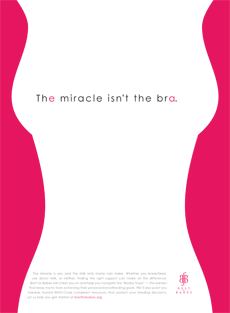
 @BestforBabes
@BestforBabes Best For Babes
Best For Babes



